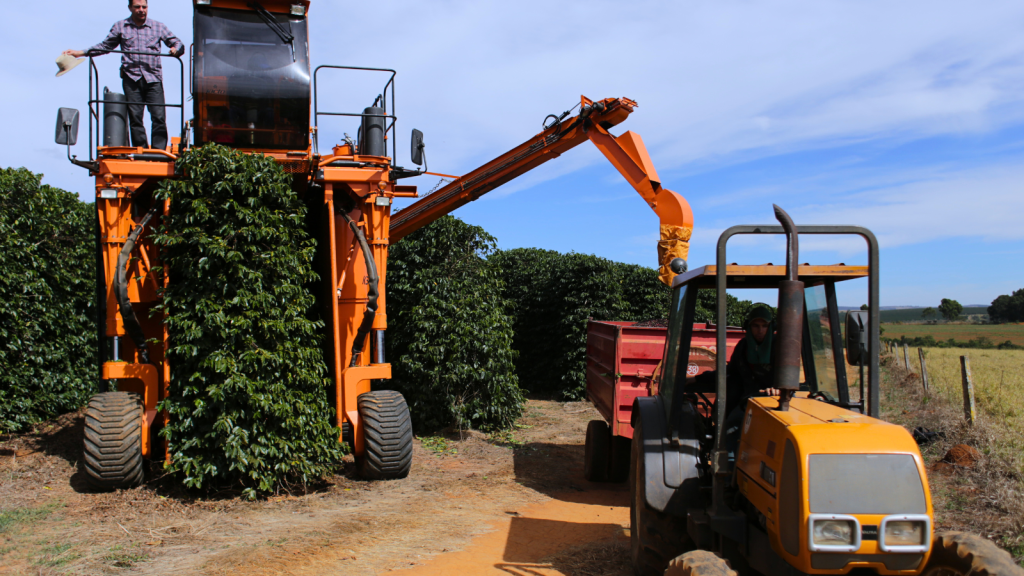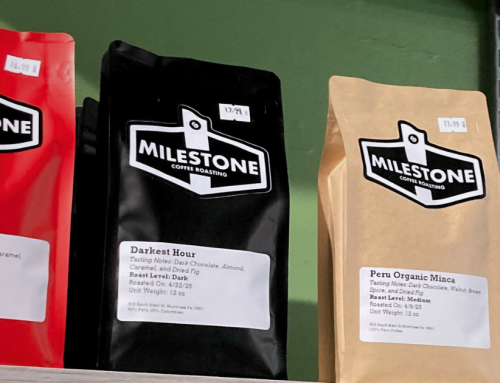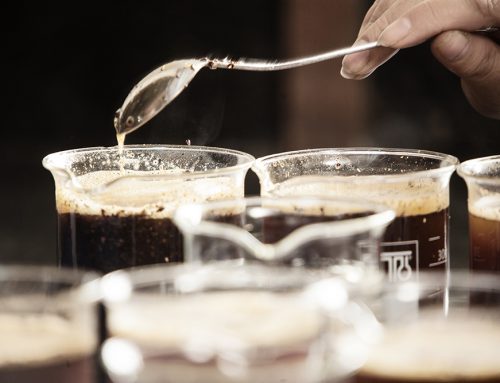Shortly after tariffs first landed in early April 2025 with “Liberation Day,” most imports were given a 10% rate. That alone was disruptive—this was the first time in recent memory that U.S. coffee imports were hit with tariffs. The shock was immediate, the questions were many, and the impact was felt across the specialty coffee supply chain. Four months later, tariffs on coffee are higher than ever. The landscape is shifting, and the situation is escalating. Here’s where things stand now, and what it means for you as a roaster.
While tariffs on coffee imports from many countries still face a 10% duty, geopolitical tensions have driven some rates much higher. Goods from Brazil, the world’s largest coffee producer, are now subject to a staggering 50% tariff. Other large coffee producers, like India (25%), Vietnam (20%), and Indonesia (19%), have also been hit with steep increases. These changes are reshaping the coffee trade in real time.

Mechanical coffee cherry picking in Brazil
What’s Changed Since April
- Geopolitics are adding fuel to the fire. China recently agreed to import more Brazilian coffee, which may shift supply chains and global pricing in ways we can’t yet fully predict.
- Ocean freight costs could rise. The U.S. has announced new fees on Chinese-built ships entering American ports—costs that could trickle into every bag of green coffee.
- Coffee prices from other origins may climb. If Brazilian coffee becomes more expensive, demand will grow for coffee from other producing countries, raising those prices as well.
The Facts About Tariffs
- Tariffs are a tax on U.S. businesses, not foreign producers or producing countries. The money goes from U.S. businesses to the U.S. Treasury, not to farmers.
- Tariffs increase the cost of coffee immediately, even for contracts signed before tariffs were enacted.
- They apply to nearly all imported coffees, with few exceptions (mainly qualifying Mexican coffees covered under the USMCA agreement).
- Tariffs are based on the FOB value at U.S. Customs, which may differ from the price roasters pay for green coffee.
- Importers like Genuine Origin do not profit from tariffs—price adjustments simply cover the charges we are required to pay.
What Does This Mean for Roasters?
- Expect higher replacement costs on many core origins—especially Brazil, Vietnam, India, and Indonesia.
- Blends may need rethinking. If a key blend component has a steep tariff, talk to your Genuine Origin rep about substitutions.
- Market volatility is here to stay—weather, logistics, and tariffs are all in the mix.
- Pricing on our website is all-in: the price you see includes tariffs and final-mile delivery to your roastery.
We Are Here to Support You
- We are monitoring the situation as it evolves. We’ll keep you posted via email, social and our blog.
- We’ll give you the facts so that you have talking points to help you explain price changes to your customers.
- Our team of coffee pros are here to advise you on alternative origins or blends if you want to change up any of your core coffees.
Action Steps for Roasters
- Talk to your customers proactively—be transparent about why prices are rising.
- Know your blends and identify coffees most impacted by tariffs.
- Plan ahead: if you have flexibility, lock in coffee earlier. Use Genuine Origin’s ship date at checkout to reserve coffees and lock in your price for up to 90 days.
- Speak up: use our sample letter to your representatives to push for coffee tariff exemptions (below).
Current U.S. Coffee Tariffs (as of August 2025)
*Certain coffees qualify under USMCA rules of origin.
| Country | Tariff |
|---|---|
| Bolivia | 15% |
| Brazil | 50% |
| Burundi | 10% |
| Colombia | 10% |
| Costa Rica | 15% |
| Ecuador | 15% |
| El Salvador | 10% |
| Ethiopia | 10% |
| Guatemala | 10% |
| Guinea | 10% |
| Honduras | 10% |
| India | 25% |
| Indonesia | 19% |
| Kenya | 10% |
| Mexico* | 0% |
| Myanmar | 40% |
| Nicaragua | 18% |
| Peru | 10% |
| Philippines | 19% |
| Rwanda | 10% |
| Tanzania | 10% |
| Uganda | 15% |
| Vietnam | 20% |
*Certain coffees qualify under USMCA rules of origin.
Why This Matters
Coffee cannot be produced in the U.S. at the scale we consume it. These tariffs are not protecting American farmers—they’re taxing the entire coffee supply chain, from importers to roasters to the end consumer.
Our stance is clear: coffee should not be subject to tariffs. If you agree, we encourage you to contact your elected representatives. Download our sample letter here.
We’ll continue to keep you updated as the situation evolves. In the meantime, know that every price you see on the Genuine Origin website is all-in—including tariffs, logistics, and final-mile delivery to your roastery.
Stay informed, stay connected, and don’t hesitate to reach out to us to talk strategy.
________________________________________
[Your Name]
[Your Address]
[City, State, ZIP Code]
[Your Email]
[Your Phone Number]
[Date]
The Honorable [Congressperson’s Name]
[Office Address]
[City, State, ZIP Code]
Subject: Remove the Tariffs on Coffee – A Global Industry at Risk
Dear Representative [Last Name],
I’m reaching out to ask for your support in removing the recently imposed tariffs on coffee and related imports. These tariffs, are putting strain on every link of the coffee supply chain—from farmers and processors abroad to small businesses and coffee consumers here in the U.S.
Coffee growers in the U.S. are incapable of growing the volume of coffee needed to meet the demand in the U.S., yet the entire coffee industry is now burdened with added costs that serve no protective purpose. These tariffs function as a tax on American businesses and consumers, not on foreign exporters.
As a [coffee roaster/business owner/coffee professional/consumer], I’ve seen firsthand how these tariffs are impacting our ability to source, price, and provide quality coffee:
- Tariffs raise the cost of imported green coffee by as much as 10%, with some countries seeing even steeper increases.
- These costs trickle down: affecting cafes, grocery pricing, wholesale operations, and ultimately, the coffee drinker.
- Smallholder farmers abroad—already vulnerable to climate and market volatility—are hurt when U.S. demand drops due to artificially inflated prices.
- U.S. businesses are forced to make difficult decisions about sourcing, staffing, and sustainability investments.
Meanwhile, the threat posed by coffee imports are insignificant to U.S. domestic agriculture.
We respectfully urge you to:
- Advocate for the exemption of coffee from these tariffs, as has been the historical precedent.
- Support fair and informed trade policy that strengthens, rather than disrupts, industries built on global cooperation.
- Engage with the National Coffee Association and other trade stakeholders to understand the real-world impact of these tariffs on American jobs and small businesses.
Coffee is more than a daily habit—it’s a livelihood, a global connector, and a critical U.S. import. We need smart, sustainable policies that reflect that.
Thank you for your time and attention to this urgent issue.
Sincerely,
[Your Name]
[Your Business/Organization (if applicable)]
[Your Contact Information]






